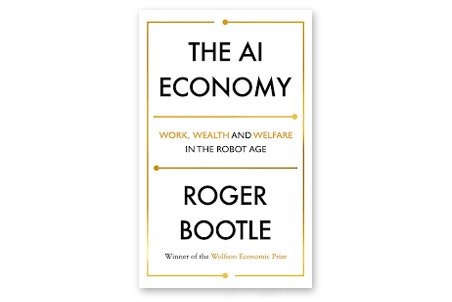Roger Bootle is a distinguished British economist, founder and Chairman of the macro-economics consultancy Capital Economics and author of six other books, a few of them acclaimed by both critics and the public. He is also quite vocal on his pro-Brexit credentials and appears regularly on radio and television discussing several topics from an economics perspective. AI and robotics being the hot topic they are, for some thinkers being THE topic of our times, he could not resist the urge and had to write about it. The result is The AI Economy, a book that aims at analysing the impact of AI on automation, employment, wealth and welfare from an economist’s prism.
The problem, as Bootle himself confesses in the preface of the book, is that he was never very adept at technology matters and his knowledge of AI and robots was very limited. He spent a year conducting research on the matter, and some of it can be felt when reading the book, but still the lack of deep knowledge on the topic and some of his deeply seated techno-phobic beliefs cloud his judgement and affect some of the arguments postulated in the book.
Bootle first reviews the economic development from the Industrial Revolution to the present and the impact technologies like the steam machine, the injection engine, electricity, or computers had on productivity, wealth creation and job displacement. When we get to AI and robots, he considers them one technology more, not unlike all the others that preceded it, and with possibly a smaller effect on our lives than some others.
He makes an assessment of AI based on the eternal promise of driverless cars that never materialised and other selected examples, to conclude that basically there will not be an impending doom and there will always be jobs for humans. Robots are currently useless, as they can’t even fold well a towel or unscrew a bottle of wine, and Artificial Intelligence is like an alarm clock on steroids, but it is not intelligent at all. Human beings will always be better on judgement, emotional intelligence, creativity and are even cheaper than robots, so what is all the fuss about?
As Hulett said, there are no facts about the future. Nobody knows exactly what will happen in the future, so Bootle, like many other economists and thinkers, may be right and AI and robots will destroy some jobs, but will create many others, so we will continue having enough jobs for all. To be honest I don’t know who is right or wrong on this debate, nobody knows, so I have no issue with this line of reasoning, but I do have issue on the manner Bootle defends his case: it is not well researched, there are only some partial examples of what AI and robots can do and he seems to apply a linear thinking to technologies that are still growing exponentially.

He dismisses very lightly the risks of automation and he believes he has demonstrated his case strongly enough that he does not need to provide any more proofs and arguments, but he has not presented a strong case, far from it. This taints the rest of the book, as Bootle will often refer to this argument in many other discussions. There are a few examples throughout the book in which he refers to what might happen were the machines to displace workers, but he believes it is not necessary to delve deeper in the matter as he has sufficiently demonstrated that such thing will not happen.
The author borrows an example from author Calum Chace to explain exponential growth: it would take a drop of water that doubles every minute 49 minutes to fill an entire football stadium with water, but it would only be 7% full after 45 minutes.
We have all heard about Moore’s Law (which as Bootle correctly says, isn’t really a law and will eventually run out of steam). Technology is growing exponentially, so it is difficult to foresee how it will evolve in the next few years. Bootle rightly argues that all exponential growth is really S shaped and is deemed to eventually reach a plateau (not sure if techno-utopians like Kurzweil or Diamandis have taken this into consideration when conducting their predictions), but we may still be in the middle of the almost vertically upwards looking section of the S and we don’t know how much growth there is still left, so it is likely that AI will continue improving at an ever-faster pace.
Bootle talks about exponential growth and is familiar with it, but then he does not apply what he knows when talking about AI and robots. He seems to think linearly about technology: driverless cars have so far sucked, so they will continue doing so; robots today are not able to do a good job as waiters, they will never do; AI has been able to beat the world human champions in chess and go, but that was due to brute force data analytics, not to any sort of intelligence, and AI will not be able to leave these niche specific skills.
The author has a shallow knowledge of technology, as confessed by himself, and this clouds his judgement and analysis. A good example is his portrait of Internet of Things (IoT):
“so, we will be able to monitor umpteen subjects in our everyday lives and tell whether they need renewing, polishing, cleaning, or mending. So what? I suppose there might be some helpful instances, but they will surely be peripheral.
(…) In the future, doorknobs and curtains will also be able to speak to us when they need some attention, rather like those ghastly disembodied voices or noises in cars that tell us when we haven’t fastened our seatbelts. Heaven forfend! I have a dystopian vision of all the objects in my life screaming at me in a cacophony of useless information”
This episode is quite funny actually, but it completely misses the point of what IoT really is about and all the potential benefits it has in our daily lives and in manufacturing and other sectors. There are other similar examples throughout the book about robots and AI.
The problem is that the author has a certain belief on what robots are and how undesirable they are for him, and he projects this belief onto the entire human population. He says that human beings will never willingly travel on a plane piloted or a bus driven by a robot:
“Will people really be prepared, en masse, to take long journeys in a coach completely in the hands of AI? And put their children on such coach? I doubt it.”
He doubts it, but if the technology is demonstrated to be safer than a human driver, why not? Human beings get used to new normalities very quickly. There are already plenty of driverless trains in use and nobody seems to worry about it.
It is the same with robots never replacing waiters because having a friendly and competent waiter is part of the dining experience. Tell that to all the people who prefer to order their McDonald’s burger in the self-service kiosks not for convenience, but because they prefer not to talk to anybody. Admittedly McDonald’s is not a good example of fine dining, but my argument here is that people are not always seeking human contact and human service, oftentimes is the opposite.
AI has advanced a lot not only on manual capabilities, but also on cognitive and affective ones. There is now AI that can detect human emotions based on body language or the voice, and measure their response accordingly. Of course, Bootle dismisses this, once again thinking that everybody thinks like him:
“Good luck with that one! I suspect that robots pretending to have emotional reactions and an understanding of people would soon be regarded by humans as ridiculous”
Maybe this is the case for many people today, but once again he doesn’t allow for the technology to improve enough and human beings to change their attitudes and get used to it as likely possibilities.
The author thinks in absolutes, in black and white, and he doesn’t allow much space for greys and for new possibilities that aren’t evident today: “there are many things that they will never be able to do better than humans”. Never? Are you sure? Never is a long time…
The AI Economy is rather closed-minded and short-sighted, and it is based on a premise that is not sufficiently developed or demonstrated, which is a shame, because the economic analysis that follows is well articulated and insightful. It is a pity that Mr. Bootle was not predisposed to write this book with a more open mind. The result would have been much more insightful and enjoyable to read.
“The AI Economy”, by Roger Bootle

1 comment
[…] point also in other books reviewed on this site –A World Without Work by Susskind and The AI Economy by Bootle-, with different diagnoses and proposed solutions. Kai-Fu Lee’s are closer to […]